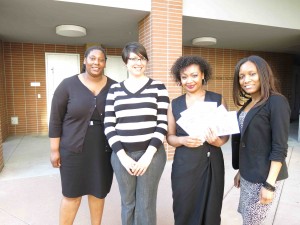Responding to Crisis- Diversity and Activism in Librarianship
GSLIS Students Karen Barton (M.A.), Tracy Drake (M.A.), Latesha Velez (PhD) and Melissa Villa-Nicholas (PhD) discussed librarianship, diversity and technology at the University of California, Irvine’s History Graduate Student Association’s 17th Annual Conference “Responding to Crisis: Historical and Contemporary Strategies of Resistance.
The conference brought together graduate students from all over the country to discuss this historic moment where academic, interdisciplinary and community work is increasingly under attack. Conference organizers explain that, “’Historicizing crisis’ for this conference means putting the current crisis into context by examining historical conflicts as well as discussing current responses to today’s issues.” Students from the fields of Medicine, Sciences, Law, Social Sciences and Humanities participated in presenting their work in order to forge alliances and bring strategies into conversation with each other.
GSLIS graduate students Barton, Drake, Velez and Villa-Nicholas coordinated their research interests and conference presentation through their membership in the GSLIS Students of Color Student Group. Karen Barton discussed her work in the Urbana Free Library as an advocate and activist of digital literacy training. Tracy Drake presented on the history of The Social Responsibilities Round Table and the American Library Associations commitment to diversity and social justice from the years 1969-1984. LaTesha Velez’s research looked at the mission of inclusion at the University of North Carolina, Greensboro Libraries’ diversity initiatives programming. Melissa Villa-Nicholas presented on the history of REFORMA and Latina/o librarian activism in the digital age.
The four students’ research intersected in order to display the historical and contemporary initiatives and barriers to diversity and activism within librarianship. As a collaborative effort, the four presentations revealed the intersection of technology, diversity, librarianship and activism.

